|
Bhagawan Sri Sathya Sai Baba has often stated that spiritual progress is
not possible until one is equipped with a healthy body and a sound mind.
Hence, healthcare is one of the major areas of focus for service
projects undertaken by Bhagawan as a part of His Divine Mission.
Commemorating the 80th year of the Advent of Bhagawan, the Sri Sathya
Sai Seva Organization organized an International Sai Medical Conference
on 3rd and 4th of September, 2005 in Prasanthi Nilayam. More than 900
doctors, surgeons, professors and medical experts and eminent
personalities across various specializations in the fields of medicine
and healthcare from across the globe assembled at the Divine Lotus Feet
to imbibe the Divine teachings and to discern their role in the Divine
Mission.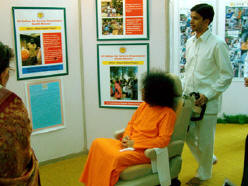
On
3rd morning, Bhagawan inaugurated an exhibition on the theme “Global Sai
Health Mission”, which highlighted the medical Seva undertaken by Sri
Sathya Sai Seva Organizations all over the world. At 8.30 a.m., Bhagawan
granted darshan to the thousands assembled in Sai Kulwant Hall and
formally inaugurated the conference by lighting a lamp. Dr. Michael
Goldstein, the chairman of the Prasanthi Council, welcomed the delegates
and spoke a few words by way of introduction and outlined the scope of
the conference. He was followed by Dr. A.N.Safaya, Director, Sri Sathya
Sai Institute of Higher Medical Sciences, Prasanthi Gra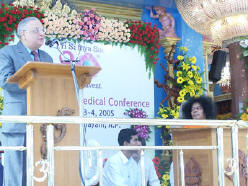 m
and Whitefield. Dr. Safaya is an eminent figure in the Indian medical
scene having held the post of Medical Superintendent, All India
Institute of Medical Sciences for nineteen years before taking over as
Director at Bhagawan’s super-speciality hospitals. Dr. Safaya chose to
speak on the theme, ‘Ideal Sai Healthcare’. He held out the super-speciality
hospitals and the general hospitals set up by Bhagawan at Prasanthi
Nilayam and Whitefield, Bangalore as sterling examples of translating
Bhagawan’s vision of healthcare into reality. He said that the basis of
Bhagawan’s mission of healthcare is Divine Love that is given to
everyone equally without any consideration of religion, nationality or
economic status. This philosophy of healthcare stands on four pillars: m
and Whitefield. Dr. Safaya is an eminent figure in the Indian medical
scene having held the post of Medical Superintendent, All India
Institute of Medical Sciences for nineteen years before taking over as
Director at Bhagawan’s super-speciality hospitals. Dr. Safaya chose to
speak on the theme, ‘Ideal Sai Healthcare’. He held out the super-speciality
hospitals and the general hospitals set up by Bhagawan at Prasanthi
Nilayam and Whitefield, Bangalore as sterling examples of translating
Bhagawan’s vision of healthcare into reality. He said that the basis of
Bhagawan’s mission of healthcare is Divine Love that is given to
everyone equally without any consideration of religion, nationality or
economic status. This philosophy of healthcare stands on four pillars:
- Globalisation of medicine - Healthcare should be made available to
one and all.
- Decommercialisation of medicine - Quality medical care should be
provided absolutely free of charge.
- Human Values in medicine - Medical care should be administered
with love.
- Spiritualisation of medicine - It should cater to the needs of not
just the patient’s body but also the mind and soul.
By applying these
canons, doctors can understand that the interaction between the patient
and the doctor has a spiritual dimension to it. They learn to treat
patients as human beings rather than as a disease complex. It is in this
way that the ancient Indian ideal of ‘Arogyam’, the absence of disease,
can be achieved.
Dr. Safaya
concluded by saying that by establishing these hospitals, Bhagawan has
provided the medical community with a working model that can be
replicated anywhere and help in realizing the vision of health for all.
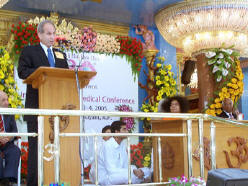
Dr. Alan H. Gradman, Chief Cardiologist at Western Pennsylvania
Hospital, Pittsburgh was the next speaker. He began by outlining the
tremendous advances that have taken place in the past few decades in the
technology and techniques available for the treatment of cardio-vascular
diseases. However, he said, concomitant with this positive development,
there has arisen a negative trend – the invasion of economic
self-interest into healthcare. He said that the present economic model
of healthcare that is being followed in developed countries is flawed as
it allocates medical resources according to the ability to pay rather
than according to the need of the patient. This results in an
unfortunate situation where many people are left without adequate
medical attention. Bhagawan, Dr. Gradman said, has given the remedy to
this crisis, showing the world what is possible in the field of
healthcare by building hospitals that provide world class medical care
without charging any fees whatsoever from the patients. The hospitals
are also a testimony to what wonders can be achieved by dedication and
commitment. Dr. Gradman concluded by saying that the most important
lesson he has learnt by observing the working of Bhagawan’s hospitals is
that the definition of service is not restricted to undertaking some
welfare work in one’s leisure; doing one’s duty diligently and with
dedication is also a form of service.
Bhagawan answered the prayers of the delegates and the thousands
gathered in Sai Kulwant Hall and granted His Divine Message. He
elaborated on the theme of what constitutes true education. In modern
society it i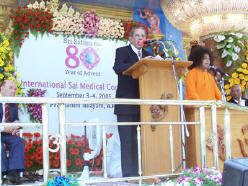 s
commonly understood to be the transmission of the information contained
in text books. But, the true purpose of education, Bhagawan said, is the
awakening of the divine consciousness of man. This process of awakening
is called ‘Educare’. In order to get an education people traverse the
entire globe, but Educare only requires one to turn one’s vision from
the outside world to the realms within. One must distance oneself from
identification with the body and realize one’s identity with the
Indweller of the body, which knows neither birth nor death, joy nor
sorrow, bondage nor liberation. The body is given for the fulfillment of
a particular task, and one must retain the ‘I’ consciousness only to
accomplish that task. Relinquish physical attachments for they only lead
one to sorrow. The true devotee is one who realizes the principle of
Oneness by seeing divinity in all creation, He said. s
commonly understood to be the transmission of the information contained
in text books. But, the true purpose of education, Bhagawan said, is the
awakening of the divine consciousness of man. This process of awakening
is called ‘Educare’. In order to get an education people traverse the
entire globe, but Educare only requires one to turn one’s vision from
the outside world to the realms within. One must distance oneself from
identification with the body and realize one’s identity with the
Indweller of the body, which knows neither birth nor death, joy nor
sorrow, bondage nor liberation. The body is given for the fulfillment of
a particular task, and one must retain the ‘I’ consciousness only to
accomplish that task. Relinquish physical attachments for they only lead
one to sorrow. The true devotee is one who realizes the principle of
Oneness by seeing divinity in all creation, He said.
 After
the inaugural session at Sai Kulwant Hall, the delegates adjourned for
the closed sessions in the Institute Auditorium where many eminent
medical professionals from different parts of the globe presented their
papers on the theme of the conference, ‘Ideal Sai Healthcare’. After the
deliberations held over two days, the delegates again assembled in
Bhagawan’s presence on the afternoon of 4th for the valedictory session
of the conference. Dr. Goldstein introduced the speakers for the
session. Dr. Michael Rakoff, a consultant in Hospital Administration to
many hospitals in USA, who spoke first, recalled the advice given by
Bhagawan when he asked Him how he should teach ethics and human values
to his students. Bhagawan told him that the only way to teach the values
of truth, love and compassion is by putting them into practice in one’s
own life. His conduct would engender the process of absorbing these
values in the students. Dr. Rakoff shared with the gathering three most
valuable lessons he had learnt from Bhagawan: 1) One need not attempt to
change the world. All that is needed is to change oneself. 2) To have
love and compassion towards all beings 3) Unity of Thought, Word and
Deed. After
the inaugural session at Sai Kulwant Hall, the delegates adjourned for
the closed sessions in the Institute Auditorium where many eminent
medical professionals from different parts of the globe presented their
papers on the theme of the conference, ‘Ideal Sai Healthcare’. After the
deliberations held over two days, the delegates again assembled in
Bhagawan’s presence on the afternoon of 4th for the valedictory session
of the conference. Dr. Goldstein introduced the speakers for the
session. Dr. Michael Rakoff, a consultant in Hospital Administration to
many hospitals in USA, who spoke first, recalled the advice given by
Bhagawan when he asked Him how he should teach ethics and human values
to his students. Bhagawan told him that the only way to teach the values
of truth, love and compassion is by putting them into practice in one’s
own life. His conduct would engender the process of absorbing these
values in the students. Dr. Rakoff shared with the gathering three most
valuable lessons he had learnt from Bhagawan: 1) One need not attempt to
change the world. All that is needed is to change oneself. 2) To have
love and compassion towards all beings 3) Unity of Thought, Word and
Deed.
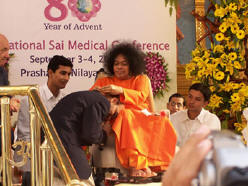 Dr.
Venkatraman Sadanand, Fellow of Paediatric Surgery in Children’s
Memorial Hospital, Chicago and Adjunct Professor in Game Theory at
University of Guelph, Ontario was the next to speak. He said that the
need of the hour for doctors is to consider their patients as God,
sacrificing one’s self interest for the welfare of the patient. Indeed,
doctors must function as conduits for God’s Love to flow into their
patients. Dr.
Venkatraman Sadanand, Fellow of Paediatric Surgery in Children’s
Memorial Hospital, Chicago and Adjunct Professor in Game Theory at
University of Guelph, Ontario was the next to speak. He said that the
need of the hour for doctors is to consider their patients as God,
sacrificing one’s self interest for the welfare of the patient. Indeed,
doctors must function as conduits for God’s Love to flow into their
patients.
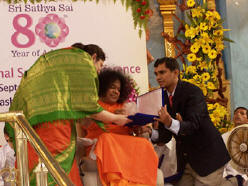 After
the talks by Dr. Rakoff and Dr. Sadanand, Dr. Safaya and Dr. Goldstein
delivered their closing remarks on the proceedings of the conference.
Following this, Bhagawan graciously presented mementos to the doctors
who had made presentations during the two day conference to the
delegates, and also to the chief organizers of the conference. A few of
the doctors spoke on behalf of the delegates expressing their gratitude
to Bhagawan and prayed for His blessings and guidance. The proceedings
concluded with arati being offered to Bhagawan. After
the talks by Dr. Rakoff and Dr. Sadanand, Dr. Safaya and Dr. Goldstein
delivered their closing remarks on the proceedings of the conference.
Following this, Bhagawan graciously presented mementos to the doctors
who had made presentations during the two day conference to the
delegates, and also to the chief organizers of the conference. A few of
the doctors spoke on behalf of the delegates expressing their gratitude
to Bhagawan and prayed for His blessings and guidance. The proceedings
concluded with arati being offered to Bhagawan.
Jai Sai Ram!
online source:
www.srisathyasai.org.in
|